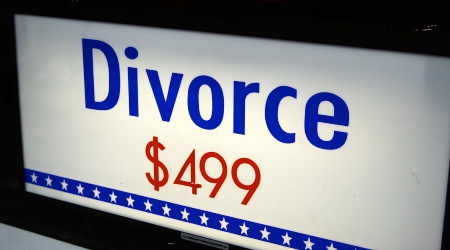Causes Of Consumer Bankruptcy

The primary causes of consumer bankruptcy are the usual suspects like divorce and job loss. A more recent cause is substantial medical bills while not having the benefit of health insurance. And unfortunately, a common cause of personal bankruptcy is good old-fashioned stupidity. While each of these situations may be different for any particular individual most consumer bankruptcies will fall into one of these four categories.
Divorce
Many couples, either newly married or having been together for a number of years, will often accrue significant amounts of debt when purchasing a home, buying new vehicles or traveling and enjoying life. This normally is not a problem because dual income families often have plenty of financial resources to pay monthly debt and build savings. However, divorce can significantly alter the dynamic of a family due to increased stress, resentment and placing blame. Bills get lost in the shuffle and he said she said scenarios lead to missed payments, increased interest and penalties and possible default on outstanding debts. It is not uncommon for one or both parties to seek the protection of consumer bankruptcy after a divorce.
Job Loss
Losing one's job and joining the ranks of the unemployed is virtually guaranteed to lead to declaring bankruptcy. It's a common scenario that when you have no income coming in and money is still going out to pay for food, utilities and rent that unsecured debt like credit cards will stop being paid. Much like divorce, this is not a conscious decision to avoid financial obligations but a result of unexpected adverse situations which lead consumers to seek the protection and benefits bestowed by consumer bankruptcy. Even once employment is obtained, existing debt may have ballooned due to penalties and interest and bankruptcy provides a clean slate to start from scratch and get back on track financially.
Medical Bills
Upwards of 45 million Americans currently do not have medical health insurance. In situations where someone is hospitalized or has a severe illness like cancer or chronic illness like Crohn's disease or rheumatoid arthritis, medical bills can run into hundreds of thousands of dollars or more. Even for gainfully employed individuals who are otherwise financially responsible, but are unable to purchase health insurance, excessive medical debt will sometimes lead to consumer bankruptcy. It often depends on the amount of medical debt in question and whether or not the health institution will accept partial payment or set up a payment plan when working with the patient. Even patients who want to pay back the debt may not have a realistic opportunity to do so resulting in consumer bankruptcy.
Being Stupid
It's sad to say but some people just make poor financial decisions and have overall bad judgment. Being young and dumb may sound like a rite of passage for consumers but it really shows a lack of maturity and an absence of taking personal responsibility for one's actions. Many young people straight out of college rack up tens of thousands in debt with an entry-level job and huge student loans. There really is no other explanation than being stupid and shortsighted. Living for today without caring for tomorrow means many people shoot themselves in the foot and look to bankruptcy to bail them out of their own incompetence. These reasons may lead to them being denied bankruptcy protection.







